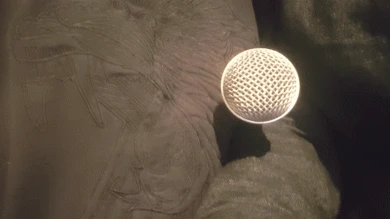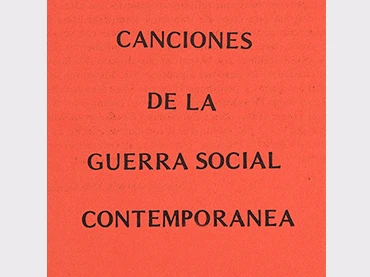-
Museo Reina Sofía, Sabatini Building, Auditorium
Programme 1. Lettrism
-
Friday, 21 February 2020 – 7pm
Session 1
Second session: Saturday, 22 February – 7pm
Isidore Isou
Traité de bave et d’éternité (Treaty on Venom and Eternity)
France, 1951, b/w, original version in French with Spanish subtitles, DA, 123’. Museo Reina Sofía Collection.– Presented by Kaira M. Cabañas, art historian specialised in Lettrism, and author of the book Off-Screen Cinema: Isidore Isou and the Lettrist Avant-Garde (University of Chicago Press, 2015) [audio intervention]
Isou, a young Romanian poet and intellectual who had moved to Paris, was only 27 when he presented this film at Cannes. His aspirations included: resuming Russian Dadaist and formalist investigations into language, akin to his compatriot Tristan Tzara, and surmising the end of the then exhausted Surrealist movement. His goal: the birth of a new artistic avant-garde movement based on the liberating potential of the letter between sign and sound; that is, outside the logical order of word and language. This cult film constitutes his birth certificate and, produced on discarded footage from the French army, is an essay on artistic unrest through the life of a young artist. It also innovates in a hugely significant way: the ‘discrepant’ edit, in which the image becomes dissociated from the sound and is thus no longer the grounds for what we see on the screen, and ‘chiselled’ cinema, with scratches, crossings-out and other physical attacks on the actual film.
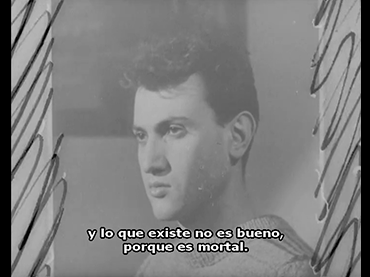
-
Friday, 28 February 2020 – 7pm
Session 2
Second session: Saturday, 29 February – 7pm
Gil J Wolman
L’Anticoncept (Anti-concept)
France, 1951 b/w, original version in French with simultaneous interpretation into Spanish, DA, 60’. Museo Reina Sofía Collection.“I am immortal and I am alive” are the words which conclude the audio of this unprecedented film work and which appear to allude to the fascination that still stirs in artists and theorists today. A huge hot-air balloon ushers us into the film theatre, acting as a volumetric screen folded upon itself, in which an abstract 35mm film with circles and opaque black blocks is projected. The sound comes from the voice of Gil J Wolman, who leaves behind discursive logic utterances, returning the voice to the phoneme, the breath, the body, in memory of Artaud. The film was censored in France from 1952 onwards due its strobe lights; “when the powers of the cop are added to professional blindness, we have idiots banning anything they don’t understand”, Guy Debord would write. Anti-Concept would be key in Debord’s first film and also to the film experiments of Brion Gysin and William Burroughs. For this series, the film is reactivated adhering to Gil J Wolman’s maxim: “recounting a work lacks a relationship with the work; revive it”.
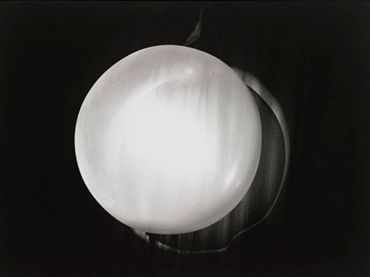
-
Saturday, 12 September 2020 – 7pm / Museo Reina Sofía, Sabatini Building, Auditorium
Session 3
Second session: Sunday, 13 September 2020 – 7pm / Museo Reina Sofía, Sabatini Building, Auditorium
François Dufrêne
Tambours du jugement premier (Drums of the First Judgement)
France, 1952 (1973 register), 72’. Reinterpreted by Gran Circo IndómitoA film with no screen and no sound. The Lettrists would become pioneers in disarming the film device; namely, in thinking of the cinema experience in another way. Therefore, they would not only presage film installations and expanded cinema, they would also reconnect with their own origins, despite them not being encoded in a dominant form. This film of “imaged cinema”, in the words of Dufrêne, takes us to the variety show, fair, and cinema in an unpredictable and uncontrolled situation. The recital, the voice and aphorisms articulate a series of events that occur in the room and which, on this occasion, an ensemble of Gran Circo Indómito poets and artists adapt to the present.

-
Museo Reina Sofía, Sabatini Building, Auditorium
Programme 2. René Viénet
-
Monday, 2 March 2020 – 7pm
Session 1
Second session: Thursday, 10 September 2020 – 7pm. Cancelled
René Viénet
La dialectique peut-elle casser des briques? (Can Dialectics Break Bricks?)
France, 1972, colour, original version in Cantonese with audio modified in French and with Spanish subtitles, DA, 90’René Viénet develops the ludic and subversive possibilities of Situationist détournement (diversion), a technique for appropriating, resignifying and making images and mass-culture materials circle again with a new and critical meaning with respect to the original. In so doing, the Situationists managed to reveal the ideological workings of the entertainment industry. In this film, Viénet appropriates Crush (1972), a martial arts film from Honk Kong made by Kuang-Chi Tu, in which some Japanese thugs terrorise Korean peasants, culminating in a fight. Viénet turns it into a confrontation between bureaucrats and proletariats inside State capitalism, between the use of dialogue and the use of violence, resulting in an aesthetically and politically avant-garde Situationist comedy demonstrating that play and humour are at once two effective and essential weapons in social critique.
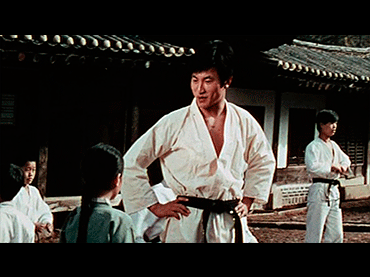
-
Wednesday, 4 March 2020 – 7pm
Session 2
Second session: Saturday, 7 March – 7pm
René Viénet
Chinois, encore un effort pour être révolutionnaires (One More Effort, Chinamen, If You Want to Be Revolutionary)
France, 1977, colour, original version in Mandarin with audio modified in French and with Spanish subtitles, 35mm, 120’– First session presented by René Viénet and Carlos Prieto Acevedo, editor, film programmer and translator of Viénet’s films.
In May 1965, Guy Debord and Gil J Wolman published the article “Mode d’emploi du détournement” (A User’s Guide to Détournement), where they assert: “clearly it is in the sphere of film where diversion is at its most effective and, undoubtedly, for those concerned about it, most beautiful (…). We can say that Griffith’s Birth of a Nation is one of the most important films in the history of cinema due to the mass of new contributions it represents. On the other hand, it is a racist film: in no way does it merit being screened in its current form. It is much better to divert its whole (…). A diversion like this, a very moderate one, would be nothing, in short, but the moral equivalent of the restorations of ancient paintings in museums”. René Viénet continues with the masterful use of detournement in this anti-Maoist film — a “spectacular” concentrated regime, according to Debord — together with newsreels and fiction films.
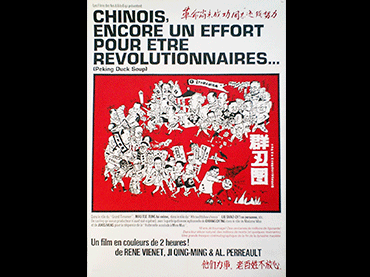
-
Círculo de Bellas Artes and Museo Reina Sofía
Programme 3. Guy Debord
-
Thursday, 5 March 2020 – 7:30pm / Círculo de Bellas Artes, Cine Estudio
Session 1
Guy Debord
Hurlements en faveur de Sade (Howlings for Sade)
France, 1952, b/w, original version in French with Spanish subtitles, DCP, 79’Guy Debord’s first film and an example of his temporary allegiance to Lettrism. The film conveys a denial of the image, with alternate black-and-white screens and an independent soundtrack, in which dialogues are held on politics and love, news, extracts from the Civil Code, and readings of novels with the voices of Gil J Wolman, Isidore Isou, Barbara Rosenthal and Debord. Among these phrases, there is a resounding overview: “I decided to destroy cinema because it was easier than killing passers-by”. This anti-film inherits from Isou (discrepant cinema or the separation of image-audio) and is hugely influenced by Wolman’s Anti-Concept, not only in the extreme denial of the visible, but also in a specific idea: ending cinema is associated with the broadening of its critical possibilities.
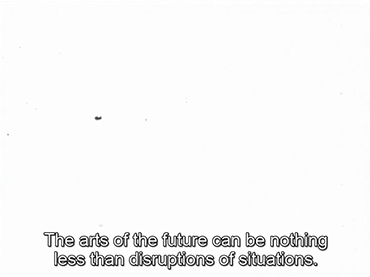
-
Sunday, 8 March 2020 – 7:30pm / Círculo de Bellas Artes, Cine Estudio
Session 2
Guy Debord
Sur le passage de quelques personnes à travers une assez courte unité de temps (On Some People Passing Through a Rather Short Time Unit)
France, 1959, b/w, original version in French with Spanish subtitles, DCP, 19’Critique de la séparation (The Critique of Separation)
France, 1961, b/w, original version in French with Spanish subtitles, DCP, 18’This session features two films made by Debord while Situationist International (1957–1972) existed. Both adhere to this movement of cultural and political agitation that promotes the rescue of life, with the latter having been turned into commodity, according to the logic of the spectacle. Therefore, they set out from the “creation of situations”, interactions between people and places that give rise to emancipatory social relations from the production-consumption axis. The conquest of a daily time and an existential space outside of this axis dominates both beautiful manifestos. In terms of audiovisual language, Debord appropriates the documentary genre of art devised by Alain Resnais (voice-over, still shots, subtitles, the fiction-documentary rupture) with an implicit objective and critique: transcending art in the recovery of life.
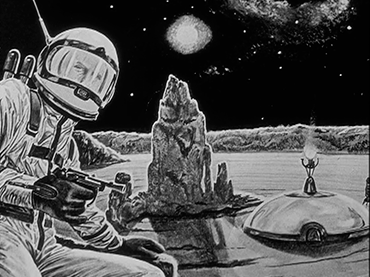
-
Tuesday, 10 March 2020 – 7:30pm / Círculo de Bellas Artes, Cine Estudio
Session 3
Guy Debord. Writing Cinema
A round-table discussion, with the participation of Amador Fernández-Savater, Hugo Savino and Manuel AsínThe cinematic writings of Guy Debord form an essential corpus for approaching the thought of the theorist and his relationship to images. Translated into Spanish for the first time by the publishing house Caja Negra, they include scripts and letters, most notably unrealised projects, for example the one in which he dedicates his last film to Spain. Participants in the round-table comprise Amador Fernández-Savater, theorist and editor of Panegírico (Acuarela Libros, 1999), the Guy Debord autobiography, Hugo Savino, essayist and translator, and Manuel Asín, editor of the book and co-curator of the series.
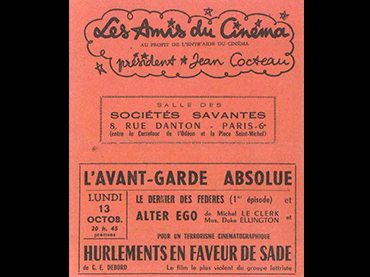
-
Thursday, 3 September 2020 – 7:30pm / Círculo de Bellas Artes, Cine Estudio
Session 4
Guy Debord
La société du spectacle (Society of the Spectacle)
France, 1973, b/w, original version in French with Spanish subtitles, DCP, 90’A film adaptation of one of the most profound, ludic and revealing literary essays of our times, Society of the Spectacle (1967), also by Guy Debord. The theoretical analysis in the film-maker’s own voice-over and the flow of appropriated and resignified images from Westerns and Hollywood war films, Soviet propaganda, advertising and pornography, seek to show the workings of this political regime, whereby, according to Debord, all forms of social relations are obstructed by images and the spectacle; in short: “[…] capital in such a degree of accumulation that it has become an image”. Debord uses this image overload to formulate a radical critique of the system based on two principles: not filming in order to not generate any new image prone to being turned into a commodity and examining the potential of cinema, in its recoding, as a weapon of ideological critique.
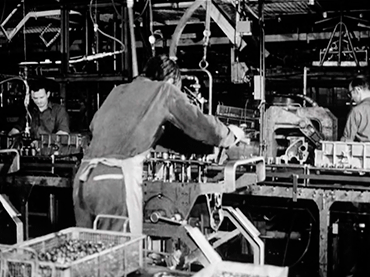
-
Friday, 4 September 2020 – 7:30pm / Círculo de Bellas Artes, Cine Estudio
Session 5
Guy Debord
Réfutation de tous les jugements, tant élogieux qu'hostiles, qui ont été jusqu'ici portés sur le film La Société du spectacle (Refutation of all Judgement, Eulogist and Hostile, Made Until this Point on the Film Society of the Spectacle)
France, 1975, b/w, original version in French with Spanish subtitles, DCP, 22’In girum imus nocte et consumimur igni
France, 1981, b/w, original version in French with Spanish subtitles, DCP, 100’Two films with a semi-wakeful, melancholy tone that reflect the belligerence of the political and social establishment towards Debord and the end of the untamed youth uprising represented by International Situationism. In Réfutation (…), the author takes charge of answering different critiques and rejections involved in the film version of Society of the Spectacle: “The most tenacious among those defeated liars still pretend to ask themselves whether the society of spectacle actually exists or whether, by chance, I am its inventor,” he said. In girum imus nocte et consumimur igni is a palindrome in Latin, and is known as a verse of the devil meaning “we move in the night and we are consumed by fire”. Scenes from Westerns, war and social films narrate the heroic times of Situationism as the party’s end. Debord, transformed into Errol Flynn or General Custer from They Died With Their Boots On, admits its rejection in the face of a drugged and self-complacent society.
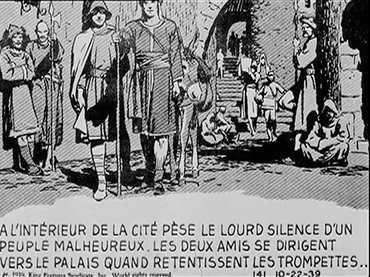
-
Saturday 14 November, 2020 - 5:30pm / Museo Reina Sofía, Sabatini Building, Auditorium
Session 6
Brigitte Cornand y Guy Debord
Guy Debord, son temps et son art (Guy Debord, His Time and His Art)
France, 1994, colour, original version in French with Spanish subtitles, DA, 60’A documentary on Guy Debord with a screenplay by the theorist, who says of himself: “Guy Debord made very little art, but he did make it extreme”. Screened and subtitled for the first time in Spain, the film is a deliberate testament. It was shown on Canal+, its producer, on the agreed date of 9 January 1995, together with La société du spectacle and Réfutation. Only a month or so earlier, on 30 November 1994, Debord committed suicide in Bellevue-la-Montagne.
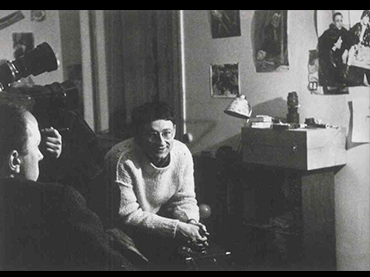
-
Saturday 14 November, 2020 – 7pm / Museo Reina Sofía, Sabatini Building, Garden
Session 7
Guy Debord
Songs of the Contemporary Social War
Concert and screening
Length: 1 hourJorge Manrique, Baltasar Gracián, conceptist baroque, Spanish anarchism, miners’ protests during Francoism… Guy Debord became passionate about Spanish culture, leading him to spend some time in Seville and even want to make a film as the culmination of his work, a project that would slip by the wayside: “thus, I will have dedicated an empty statue to Spain, a profound statue of nothing. Is there a more beautiful statue?”, Debord wrote to Jorge Semprún in 1986. The film is replaced by a songbook that narrates post-Francoist Spain: social movements, proletariat autonomy, neighbourhood organisations and the whole world of transformative energy and possibility moulded in the Transition to democracy. The coplas, summaries of the origins of contemporary Spain, are reinterpreted by choirs, artists and present-day musicians following invaluable research by artist Pedro G. Romero.
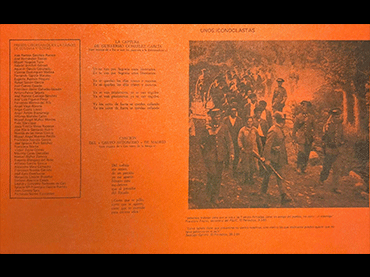
Guy Debord and René Viénet, from Lettrism to Situationism
Film Is Dead: If You Want, Let’s Proceed to the Debate
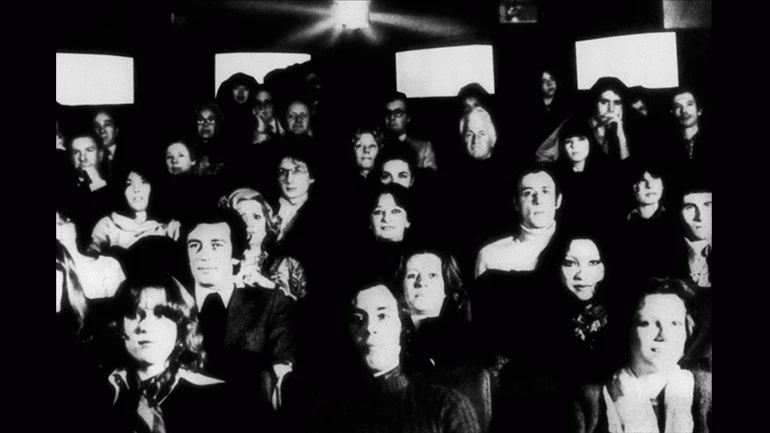
Held on 03, 04, 05, 10, 11, 12, 13, 18, 19, 25, 26 Sep, 02, 03, 09, 10, 11, 16, 17, 23, 24, 30, 31 Oct, 06, 07, 13, 14 Nov 2020
Lettrism and Situationism were two intellectual and artistic movements that foreshadowed the transcendence of the idea of the avant-garde. In the wake of Lettrism (1945–1952), a critique of the rational order of language was encountered; after Situationism, the discovery of the analysis and dismantling of a new regime based on the spectacle. Decisive to both movements was the reflection on film and cinephilia, and on the image and its transformation into a commodity. This series, therefore, joins both movements across three blocks: Lettrism, Guy Debord and René Viénet.
In “Esthétique du cinéma”, published in Ion No. 1 in April 1952, Isidore Isou wrote: “When the screening was supposed to start, Debord had to get up on stage to say a few introductory words. He simply had to say: ‘there is no film to screen’. I thought about intervening and associating his destructive scandal with the constructive theory of pure debate. Debord should have said: ‘Film is dead. There can be no more films. If you want, let’s proceed to the debate’”.
In barely a year, between the springs of 1951 and 1952, a series of films and filmic performances were presented in France which even today, in retrospect, can be seen among the most radical points of rebuttal towards the cinema institution. Isidore Isou, the founder of Lettrism — a movement which synthesised much of the energy in the post-Second World War avant-garde in France — presented, at Cannes Film Festival, the first version of his film Traité de bave et d’eternité (1951), which revolved around a complete separation of the image track and soundtrack; “discrepant editing”, in his own terminology. The screening unleashed a storm of controversy since the last third of the film was sound only and showed a black screen, opening the way for an even more radical practice by other young film-makers: in the two months that followed, different Lettrists conducted exhaustive research into the key components of the cinema device. Aspects to be vehemently desecrated were: the film screen and image in L’Anticoncept (Gil J Wolman, 1952); the film theatre and screening device in Tambours du jugement premier (François Dufrêne, 1952); and the support and public reception in Hurlements en faveur de Sade (Guy Debord, 1952). The last of these would also cause a rift to run through the group, and would definitively split the paths of Debord and the other Lettrists.
Although only recognised as such on a few occasions, Guy Debord wanted to be known as a film-maker. The central role cinema played in the “spectacular” society in the second half of the 20th century, which he would describe with acuity, afforded him the chance to become its only “accursed film-maker”. Therefore, Debord aligned his film practice with the permanent rejection of the institution — a practice which meant experimentally applying the Situationist directive of transcending art. His first public action entailed screening an imageless film, while his last rested on depriving the world of the chance to see his films, which actually occurred in the last ten years of his life. The publication, in book form, of the comments in his films (Oeuvres cinématographiques complètes, Gallimard, 2005) or the barren film version of his most acclaimed work (La societé du spectacle, 1973) were part of Debord’s calculated strategy to undermine the foundations of film culture and the society of the spectacle — the image — favouring instead its age-old adversary, the text.
The film work of René Viénet represents a counterpoint to Guy Debord’s abstractions and challenges in the Situationist movement. In his films, restored for this season, the film-maker takes detournement, or deviation, to the extreme, appropriating and re-signifying newsreels, Maoist documentaries and karate films to question, in a perpetually humorous and playful way, bureaucratised society.
Curatorship
Manuel Asín and Chema González
With the support of
Force line
Avant-gardes
Organised by
Museo Reina Sofía and Círculo de Bellas Artes
Más actividades

Aesthetics of Peace and Desertion Tactics
8 October 2025 – 24 June 2026
The study group Aesthetics of Peace and Tactics of Desertion: Prefiguring New Pacifisms and Forms of Transitional Justice proposes a rethinking—through both a theoretical-critical and historical-artistic lens—of the intricate network of concepts and practices operating under the notion of pacifism. A term not without contestation and critical tension, pacifism gathers under its name a multiplicity of practices—from anti-militarism and anti-war movements to non-violence activism—while simultaneously opening urgent debates around violence, justice, reparation, and desertion. Here, pacifism is not conceived as a moral doctrine, but as an active form of ethical and political resistance capable of generating aesthetic languages and new positions of social imagination.
Through collective study, the group seeks to update critical debates surrounding the use of violence and non-violence, as well as to explore the conflict of their representation at the core of visual cultures. In a present marked by rearmament, war, genocide, and the collapse of the social contract, this group aims to equip itself with tools to, on one hand, map genealogies and aesthetics of peace—within and beyond the Spanish context—and, on the other, analyze strategies of pacification that have served to neutralize the critical power of peace struggles. Transitional and anti-punitive justice proposals will also be addressed, alongside their intersections with artistic, visual, and cinematic practices. This includes examining historical examples of tribunals and paralegal activisms initiated by artists, and projects where gestures, imaginaries, and vocabularies tied to justice, reparation, memory, and mourning are developed.
It is also crucial to note that the study programme is grounded in ongoing reflection around tactics and concepts drawn, among others, from contemporary and radical Black thought—such as flight, exodus, abolitionism, desertion, and refusal. In other words, strategies and ideas that articulate ways of withdrawing from the mandates of institutions or violent paradigms that must be abandoned or dismantled. From feminist, internationalist, and decolonial perspectives, these concepts have nourished cultural coalitions and positions whose recovery today is urgent in order to prefigure a new pacifism: generative, transformative, and radical.
Aesthetics of Peace and Tactics of Desertion, developed and led by the Museo Reina Sofía’s Studies Management, unfolds through biweekly sessions from October to June. These sessions alternate between theoretical discussions, screenings, work with artworks and archival materials from the Museo’s Collection, reading workshops, and public sessions. The group is structured around sustained methodologies of study, close reading, and collective discussion of thinkers such as Judith Butler, Elsa Dorlin, Juan Albarrán, Rita Segato, Sven Lütticken, Ruth Wilson Gilmore, and Franco “Bifo” Berardi; historical episodes such as the anti-nuclear and anti-arms race movement in Spain; and the work of artists and activists including Rojava Film Commune, Manuel Correa and the Oficina de Investigación Documental (Office for Documentary Investigation), and Jonas Staal, among other initial cases that will expand as the group progresses.

Institutional Decentralisation
Thursday, 21 May 2026 – 5:30pm
This series is organised by equipoMotor, a group of teenagers, young people and older people who have participated in the Museo Reina Sofía’s previous community education projects, and is structured around four themed blocks that pivot on the monstrous.
This fourth and final session centres on films that take the museum away from its axis and make it gaze from the edges. Pieces that work with that which is normally left out: peripheral territories, unpolished aesthetics, clumsy gestures full of intent. Instead of possessing an institutional lustre, here they are rough, precarious and strange in appearance, legitimate forms of making and showing culture. The idea is to think about what happens when central authority is displaced, when the ugly and the uncomfortable are not hidden, when they are recognised as part of the commons. Film that does not seek to be to one’s liking, but to open space and allow other ways of seeing and inhabiting the museum to enter stage.

Intergenerationality
Thursday, 9 April 2026 – 5:30pm
This series is organised by equipoMotor, a group of teenagers, young people and older people who have participated in the Museo Reina Sofía’s previous community education projects, and is structured around four themed blocks that pivot on the monstrous.
The third session gazes at film as a place from which to dismantle the idea of one sole history and one sole time. From a decolonial and queer perspective, it explores films which break the straight line of past-present-future, which mix memories, slow progress and leave space for rhythms which customarily make no room for official accounts. Here the images open cracks through which bodies, voices and affects appear, disrupting archive and questioning who narrates, and from where and for whom. The proposal is at once simple and ambitious: use film to imagine other modes of remembering, belonging and projecting futures we have not yet been able to live.

Remedios Zafra
Thursday March 19, 2026 - 19:00 h
The José Luis Brea Chair, dedicated to reflecting on the image and the epistemology of visuality in contemporary culture, opens its program with an inaugural lecture by essayist and thinker Remedios Zafra.
“That the contemporary antifeminist upsurge is constructed as an anti-intellectual drive is no coincidence; the two feed into one another. To advance a reactionary discourse that defends inequality, it is necessary to challenge gender studies and gender-equality policies, but also to devalue the very foundations of knowledge in which these have been most intensely developed over recent decades—while also undermining their institutional support: universities, art and research centers, and academic culture.
Feminism has been deeply linked to the affirmation of the most committed humanist thought. Periods of enlightenment and moments of transition toward more just social forms—sustained by education—have been when feminist demands have emerged most strongly. Awareness and achievements in equality increase when education plays a leading social role; thus, devaluing intellectual work also contributes to harming feminism, and vice versa, insofar as the bond between knowledge and feminism is not only conceptual and historical, but also intimate and political.
Today, antifeminism is used globally as the symbolic adhesive of far-right movements, in parallel with the devaluation of forms of knowledge emerging from the university and from science—mistreated by hoaxes and disinformation on social networks and through the spectacularization of life mediated by screens. These are consequences bound up with the primacy of a scopic value that for some time has been denigrating thought and positioning what is most seen as what is most valuable within the normalized mediation of technology. This inertia coexists with techno-libertarian proclamations that reactivate a patriarchy that uses the resentment of many men as a seductive and cohesive force to preserve and inflame privileges in the new world as techno-scenario.
This lecture will address this epochal context, delving into the synchronicity of these upsurges through an additional parallel between forms of patriarchal domination and techno-labor domination. A parallel in which feminism and intellectual work are both being harmed, while also sending signals that in both lie emancipatory responses to today’s reactionary turns and the neutralization of critique. This consonance would also speak to how the perverse patriarchal basis that turns women into sustainers of their own subordination finds its equivalent in the encouraged self-exploitation of cultural workers; in the legitimation of affective capital and symbolic capital as sufficient forms of payment; in the blurring of boundaries between life and work and in domestic isolation; or in the pressure to please and comply as an extended patriarchal form—today linked to the feigned enthusiasm of precarious workers, but also to technological adulation. In response to possible resistance and intellectual action, patriarchy has associated feminists with a future foretold as unhappy for them, equating “thought and consciousness” with unhappiness—where these have in fact been (and continue to be) levers of autonomy and emancipation.”
— Remedios Zafra

27th Contemporary Art Conservation Conference
Wednesday, 4, and Thursday, 5 March 2026
The 27th Contemporary Art Conservation Conference, organised by the Museo Reina Sofía’s Department of Conservation and Restoration, with the sponsorship of the Mapfre Foundation, is held on 4 and 5 March 2026. This international encounter sets out to share and debate experience and research, open new channels of study and reflect on conservation and the professional practice of restorers.
This edition will be held with in-person and online attendance formats, occurring simultaneously, via twenty-minute interventions followed by a five-minute Q&A.
